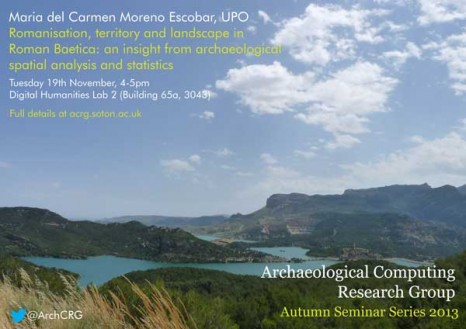Romanisation, territory and landscape in Roman Baetica: an insight from archaeological spatial analysis and statistics
This seminar will deal with alternative insights into the issue of Romanisation (understood as the cultural change between pre-Roman and Roman times) in the south of the Iberian peninsula. Traditional ways to deal with Romanisation have focused on archaeological items such as pottery, funerary traditions and architecture, and therefore have studied individual elements of the archaeological record as evidence for cultural change. However, it is possible to go beyond the individual item, and look for evidence of this cultural change on a smaller scale: the landscape. Landscape and territory can be seen as a means to understand the perception of past communities, in spite of the underlying belief that landscape does not change, which is wrong: people do change their surroundings all the time. Following this idea of landscape as evidence for cultural change, emphasis on the temporality of landscape and territory transformations may also provide insights into how the communities’ perceptions and underlying territorial models were modified through time according to new concerns and circumstances.
In this seminar, two pilot studies of the archaeology of Sierra Morena Occidental y Tierras de Antequera will be presented. These made use of archaeological spatial analysis and statistics as a means to analyse sites location during the Second Iron Age, Roman Republic and Early Empire. The aims of these pilot studies are to establish elements of continuity and change in the territorial organisation of both areas as a means to (1) understand the settlement pattern in each period and geographical area, (2) comprehend the underlying changes on past communities’ perception and organisation of the surrounding landscape, and (3) establish comparisons amongst the historical and archaeological development of these two geographically diverse areas. As a result, the combination of this landscape approach together with other traditional insights into the issue of Romanisation will improve our understanding of the cultural change between pre-Roman and Roman worlds in the south of the Iberian peninsula.

